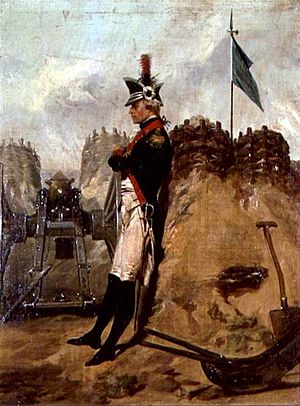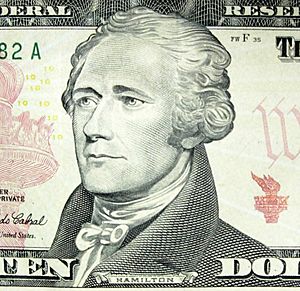Report on a Plan for the Further Support of Public Credit facts for kids
The Report on a Plan for the Further Support of Public Credit was a very important paper. It was given to the U.S. Congress on January 16, 1795. The author was Alexander Hamilton, the first Secretary of the Treasury.
In this report, Hamilton explained how the country's money system was working. He said it was "prosperous beyond all expectations." He also talked about how the government collected money. Plus, he shared a plan to pay off the country's debt. This plan aimed to make the financial system stable. Hamilton wanted to stop debt from growing too much. He believed too much debt could "endanger all Government."
This report was also a way to calm fears. Some people, like the Democratic-Republicans, worried about the national debt. They thought it might become too big to handle. Hamilton also discussed old rules about British debts in the U.S. He said these rules were not good for public credit.
He ended his report by saying how important credit was. Credit helps a country defend itself. It also helps people become successful.
Contents
How the Government Got Money
Hamilton listed the main ways the government collected money. These were called "Existing Revenue Sources." They helped pay for the government and its debts.
- Money from imported goods (like taxes on things brought into the country).
- Fees on the size of ships and boats.
- Taxes on alcoholic drinks made in the United States.
- Money from postage on letters.
- Fees for patents (protecting new inventions).
- Money earned from bank stock the government owned.
- Taxes on snuff made in the U.S.
- Taxes on sugar refined in the U.S.
- Money from sales at auctions.
- Fees for licenses to sell wines and spirits.
- Taxes on carriages used for travel.
What the Government Owed
Hamilton also explained the government's existing costs and debts. This showed where the money was going.
- About $600,000 was needed to run the U.S. government. This also covered common defense.
- Interest payments on loans from other countries.
- Interest on the money owed to people in the U.S. This was the original debt of the country.
- Interest on debts owed to different states.
- Interest on money owed to states that had lent money.
- Some temporary taxes were set aside for specific amounts. They also paid interest on a $1,000,000 loan. This loan was for foreign affairs.
- The U.S. had three types of debt stock. One paid 6% interest now. Another paid 6% interest after 1800. The third paid 3% interest now. Interest was paid every three months.
- The 6% stock could only be paid back slowly. The 3% stock could be paid back anytime.
- The time to sign up for the domestic debt loan ended in 1794. No new plans were made for those who didn't sign up.
- The law said the government had to keep its promises to creditors. Creditors are people who lent money.
- Money from selling U.S. lands in the western territory was set aside. This money was to pay off public debt.
- A special fund was created to pay off debt. It was managed by five main U.S. officers. The President had to approve. This fund used extra money from taxes. It also used money from loans. The money was used to buy back government debt.
Hamilton's Ideas for the Future
Hamilton then shared ten ideas. He believed these changes were needed to keep the country's financial system strong. He wanted it to last for many years.
Why Credit Matters
Government's Right to Tax and Take Money?
Hamilton thought about two big questions. Did the government have the right to tax its own funds? Could the government take money from foreign lenders during a disagreement or war?
Hamilton believed that when the government borrows money, it makes a promise. This promise is to an individual, not to another country. If the government taxes its own funds, it breaks this promise. This makes people lose trust. If people don't trust the government, they won't lend it money. This can hurt the country's economy. Also, taxing lenders would be unfair. They would pay taxes on their investments. This means those who trusted the government the most would pay the most.
What about foreign lenders? Some people thought a government could take money from citizens of enemy countries. Hamilton agreed that property protected by an enemy nation might be taken. But if the money was lent based on the debtor nation's laws, that promise should be kept. He said:
What in fact is property but a fiction, without the beneficial use of it? In many cases indeed the income or annuity is the property itself: And though general usage may controul the principle, it can only be as far as the usage clearly goes. It must not be extended by analogy.
The Power of Credit
Hamilton reminded Congress that the United States was a new country. It needed to be strong and active. Credit was like an "invigorating principle." It helped the U.S. compete with powerful European nations. Without credit, the U.S. would depend on other countries.
It is impossible for a Country to contend on equal terms, or to be secure against the enterprises of other nations without being able equally with them to avail itself of [credit]. And to a young Country with moderate pecuniary Capital and not a very various industry, it is still more necessary than to Countries, more advanced in both.

Hamilton also said that public credit (for the government) and private credit (for individuals) were connected. Private credit was also important for a growing country. It helped people start businesses and projects.
'Tis Wisdom in every case to cherish what is useful and guard against its abuse. 'Twill be the truest policy in the United States to give all possible energy to Public Credit, by a firm adherence to its strictest maxims, and yet to avoid the ills of an excessive employment of it, by true œconomy and system, in, the public expenditures, by steadily cultivating peace, and by using sincere, efficient and persevering endeavors to diminish present debts, prevent the accumulation of new, and secure the discharge within a reasonable period of such as it may be matter of necessity to contract. 'Twill be wise to cultivate and foster private Credit by an exemplary observance of the principles of public Credit, and to guard against the misuse of the former by a speedy and vigorous administration of Justice, and by taking away every temptation to run in debt founded on the hope of evading the Just claims of Creditors.
Hamilton Leaves the Treasury
Soon after, on January 31, 1795, Alexander Hamilton left his job. He stopped being the Secretary of the Treasury. He then went back to work as a lawyer in New York.
 | Calvin Brent |
 | Walter T. Bailey |
 | Martha Cassell Thompson |
 | Alberta Jeannette Cassell |


